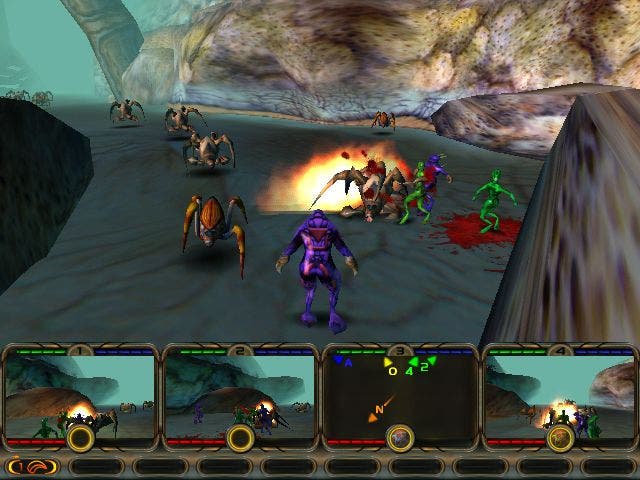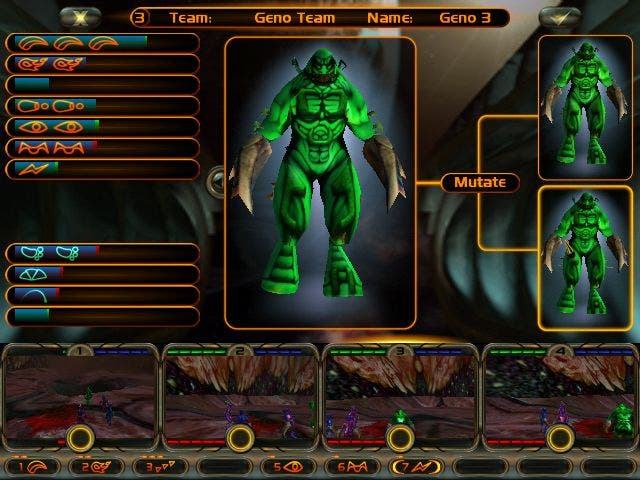Rik Heywood and Vince Farquharson of Synaptic Soup
Interview - we talk to the men behind Evolva about their new company and multi-platform game engine
One of the more innovative action games of the year 2000 was "Evolva", from British developers Computer Artworks. Set in the far future, Evolva put you in control of a squad of four "genohunters", genetically engineered creatures capable of absorbing the DNA of their victims and using it to enhance their own abilities. By the end of the game your genohunters could breathe fire, electrocute enemies, run faster than a speeding bullet, and leap over tall buildings in a single bound. Probably.
The core team behind the game was Vince Farquharson (producer and lead designer), Rik Heywood (lead programmer) and Karl Wickens (lead artist). Now they have split away from Computer Artworks to form their own company, Synaptic Soup, and we caught up with them to find out more about their latest project - a cutting-edge game engine called "Cipher"...

Evolution
Evolva proved to be a great success for Computer Artworks, a company which had previously been best known for its organic art software packages, and Vince told us that "the critical reception to Evolva was exceptional, with most scores coming in the mid 80 to mid 90 percent range".
Given the game's critical success, it's perhaps not surprising that Vince is equally happy with the end result of his work. "The game turned out pretty much the way I imagined it. That's not to say that things didn't change along the way, as they did, but at the end of the day the predominant feel and look of the game matched with the initial goals."
Those changes did mean that some of the work that the company did on the game wasn't used in the end, and the only thing Vince would change in hindsight is "not to have spent so much time on elements that didn't make it into the final cut of the game, although at the time you obviously aren't aware that that is how things will turn out". If there was one lesson to be drawn from the development of Evolva though, it was "something that was underlined rather than learnt, and that's the value of good people".
And that lesson was at the heart of the decision to break away and form an independent studio after Evolva's release. "It had been something that each of us had been thinking about independently", according to Vince. "We had all been approached on a number of occasions with proposals for starting up various ventures, but the right combination of timing and people had never happened. With Evolva finished and waiting for release we started talking about the future. Once we had all cautiously admitted that we were thinking about leaving, it was a very obvious step to start talking about doing something together. We had a good relationship from our time on Evolva, and the skills mix seemed ideal for us to realise our collective dream of starting up our own development studio."
So why is it that so many developers have this dream of setting up their own independent studio? "The advantages are that you have complete control over what you work on, how you approach it and the environment that you do this within", Vince explained. "Besides having control over the products, you also get to build the personality of your company from scratch, to hopefully be the kind of place that you always wanted to be working in."
Of course it's not all wine and roses, and there are downsides to becoming your own boss, especially given the current state of the gaming industry as it anxiously awaits the arrival of next-generation consoles. "There is a fair amount of self-sacrifice, both in terms of money and time. It's extremely competitive in today's market with the explosion of start-ups and the dip in the market as we go through format transition, so you've got to be getting up pretty early in the day to try and get the jump on the competition."
In the end the three core members of the Evolva team made the decision to jump ship, and the result was London-based company Synaptic Soup. "The name comes from our belief that although it is talented individuals that make up games teams, at the end of the day it is the team as a whole that creates the game. We wanted to acknowledge this in the company name on day one, and have something that reflected this belief. Synaptic comes from synapse, the spaces in the brain that thought impulses travel across, while Soup refers to the combination of these from different people and skills."

Cipher
The first project to emerge from this Synaptic Soup is a multi-platform game engine called "Cipher", designed to be a one-stop shop for developers looking for a technology to base their new game on, as lead programmer Rik Heywood explained to us.
"We have designed Cipher to be a complete solution to creating games. Instead of being just a renderer, or just a sound library, it combines all of the features needed to create a great game. For example, Cipher has a state of the art shader driven graphics engine, very powerful multiplayer features, a virtual machine to run the game code on, and full UNICODE support for displaying and manipulating international text (including Japanese), as well as support for input, audio, and pak files."
"Cipher has also been designed to be extremely portable, with ports under way for all the big next-gen consoles, as well as Windows, Linux and Mac. Cipher does not tie you to a specific genre either - it can be used to create first person shooters, third person action games, driving games, or whatever. And the Cipher engine comes with complete source code for everything, making it easy to customise to your specific game's needs."
To make it even easier for developers to tinker with the engine, Cipher has been designed as a number of interconnected modules and, as Rik told us, this means "that people working with Cipher can easily add, remove or extend its existing features without the whole thing breaking and becoming a total nightmare". So far the main focus has been on Cipher's terrain engine, which can handle vast open landscapes with detailed terrain features dotted with polygonal trees. "There will be other components though", Rik assured us, adding that "it will be possible to integrate them to create more interesting game worlds".
Sadly Cipher "will not support massively multiplayer games with thousands of simultaneous players, like in Ultima Online", but apart from that it is very versatile. "It is perfectly suited to online action games", according to Rik, who promises that "through the use of master servers and dedicated game servers, Cipher will make it easier than ever to find people to play against and to organise tournaments and competitions."
This won't just be for PC owners either - Synaptic Soup "are working closely with the console manufacturers to ensure that Cipher makes the most of these powerful machines", and with consoles now making the jump online, this will extend to the multiplayer code as well. The best part is that Cipher "will be supporting cross-platform multiplayer games, so PC owners could soon be competing with console owning friends in the same game".

Conclusion
According to Rik, the first games using Cipher should start to appear towards the end of 2001. The company have apparently "been getting a great deal of interest from publishers and developers" wanting to license the engine, and "some of them already have copies for evaluation and testing".
And other developers wanting to take advantage of Cipher in their games will be glad to hear that Synaptic Soup "have a very simple licence agreement" for the engine. "Cipher is licensed on a per product basis. Included in the cost is all the source code for the engine and tools, all the tools you need to export models from 3D Studio Max and regular updates during the games production. We do not charge a royalty, and you can use as many or as few of the supported platforms as you want."
Could Unreal and Lithtech be facing a new challenger in the engine licensing stakes? We'll have to wait and see, but Cipher certainly looks promising so far, and hopefully by the end of the year we should know more about Synaptic Soup's own debut game using the new engine...
-
Synaptic Soup unveil Cipher engine
Evolva designers form Synaptic Soup









